Key takeaways:
- Understanding budgeting involves balancing desires with realistic costs and anticipating unexpected expenses.
- Common mistakes include neglecting hidden costs, failing to adjust budgets regularly, and not involving team input.
- Accurate cost estimation builds trust among stakeholders and is essential for successful event management.
- Implementing a contingency fund and regularly reviewing the budget are crucial strategies for effective budgeting.
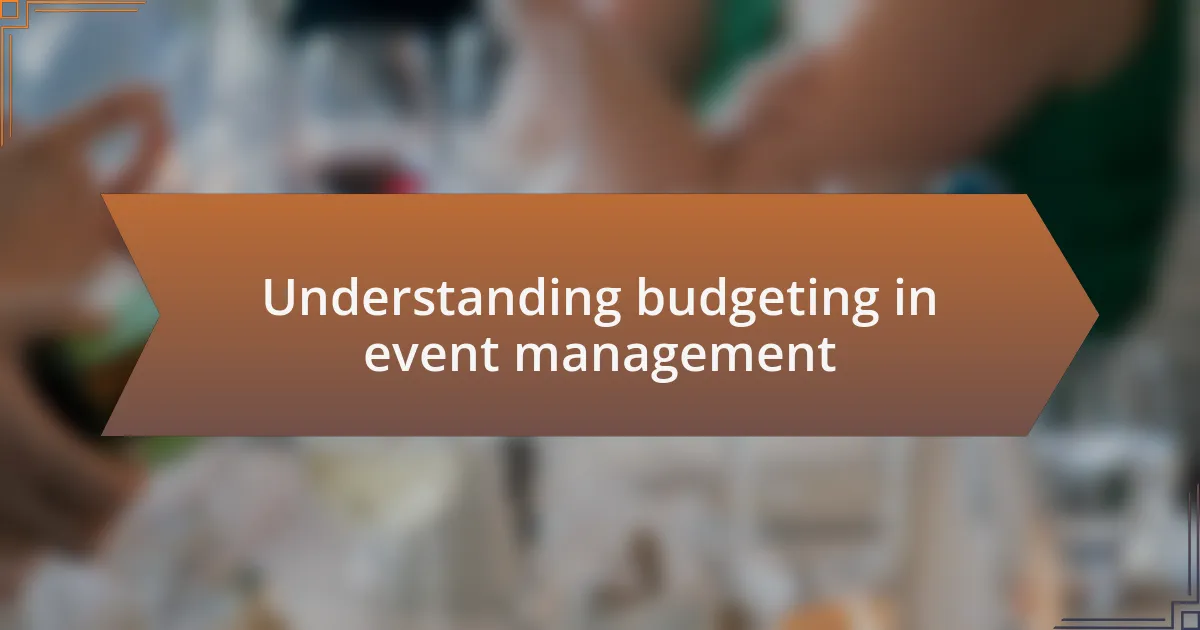
Understanding budgeting in event management
Budgeting in event management is about much more than just putting numbers on a spreadsheet; it’s about understanding the intricate dance between dreams and reality. I recall my first major event where I underestimated the venue costs, thinking I had it all figured out. The shock of realizing I was over budget left me questioning my entire planning process – how could I have overlooked something so crucial?
Every line item in a budget tells a story, reflecting both the value you place on certain elements of the event and the potential compromises you’re willing to make. When I once had to choose between a stunning floral arrangement and superior audio-visual equipment, I learned that communication is key. The audience needs to hear the speaker clearly as much as they need to enjoy the visual aesthetics, and balancing these elements can be a challenging yet important part of event budgeting.
Understanding budgeting also means anticipating the unexpected. Have you ever had a contingency plan in place, only to be caught off guard? I remember budgeting for a summer event without considering the potential for rain, and it was a costly oversight. This experience taught me the importance of having a flexible budget that includes not just expected costs, but also a buffer for surprises. Embracing this mindset has made me a more resilient event manager.
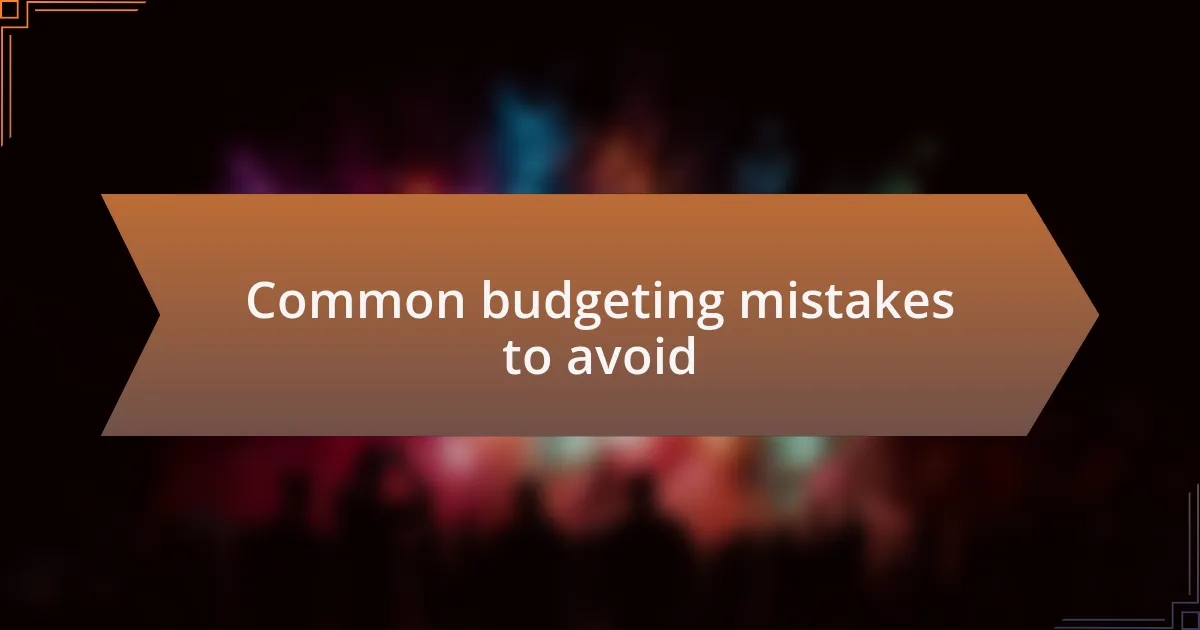
Common budgeting mistakes to avoid
One common budgeting mistake I often encounter is neglecting to account for all the hidden costs associated with an event. When I organized a corporate retreat, I focused solely on venue and catering expenses. I completely overlooked additional charges like parking fees and service staff gratuities. The surprise of these extra costs only hit me during the post-event reconciliation, leaving me scrambling to justify my overspending. It really reinforced the idea that every dollar counts, and a thorough breakdown can help avoid financial headaches later.
Another pitfall is failing to review and adjust the budget regularly. I’ve learned the hard way that once events are in motion, costs can fluctuate. During one festival I managed, I provided a budget estimate that barely lasted a week into preparation; vendor prices spiked unexpectedly. Regularly revisiting and adjusting the budget, based on real-time data, isn’t just prudent; it’s essential. How often do we assume everything will go according to plan?
Lastly, not consulting your team while budgeting can create misalignment and confusion. I once took on the bulk of my event’s financial planning without gathering input from key stakeholders. It turned out their insights on costs and potential savings were invaluable. The aftermath brought about frustration and miscommunication. Bringing others into the budgeting process not only enhances accuracy but also fosters teamwork, which can ultimately lead to a more successful event. Who wouldn’t want everyone on the same page?
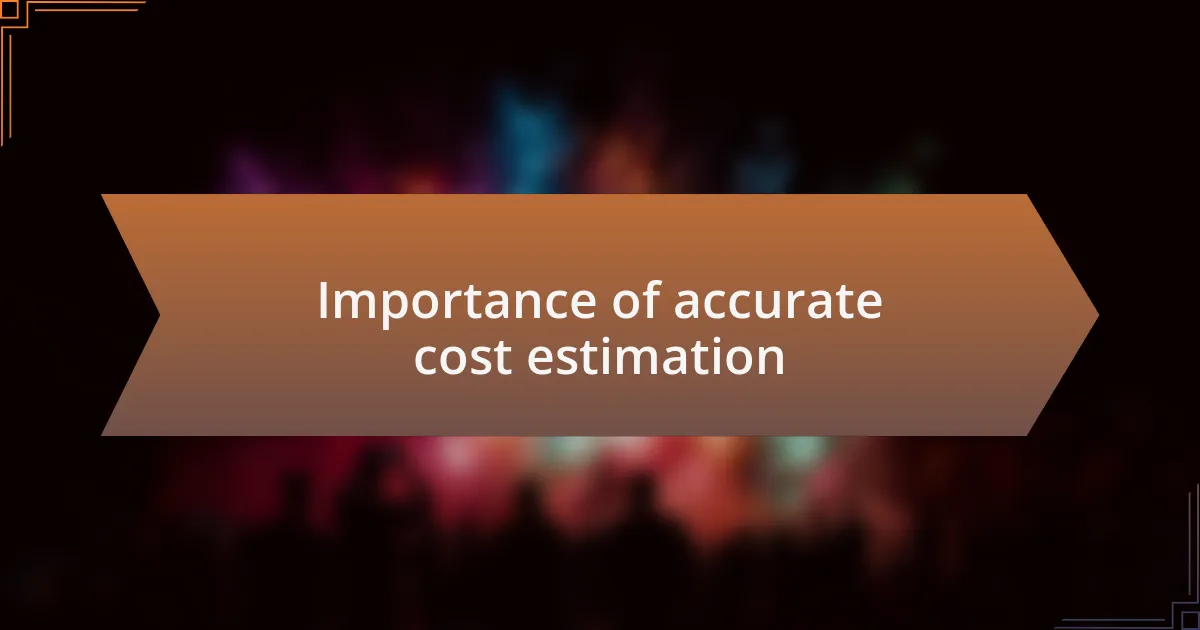
Importance of accurate cost estimation
Accurate cost estimation is crucial in event management because it directly impacts the success and sustainability of any event. I remember one time when I underestimated the AV equipment costs for a large seminar. I had sketched out what I thought were reasonable figures, but when the final bill came in, it was a jarring wake-up call. The lesson I learned was simple: if you miscalculate these essential expenses, you risk not only losing your budgetary balance but also your reputation with clients.
Effective cost estimation helps prevent overspending and supports better decision-making. When I managed a charity gala, I meticulously itemized everything, which allowed me to navigate through unexpected expenses smoothly. By accurately forecasting costs, I was able to allocate funds to other crucial areas, like marketing, that ultimately boosted attendance. Isn’t it fascinating how precise planning can transform mere numbers into actionable strategies?
Moreover, precise cost estimation nurtures trust among stakeholders and sponsors. I recall presenting a detailed budget to potential sponsors for an upcoming conference; their positive response was immediate. They appreciated my transparency and understanding of real expenses—something that can make or break partnerships in this industry. How often do we consider that stakeholders want to know they’re investing in something financially sound? Accurate cost estimations reinforce that confidence, leading to stronger relationships and potentially more significant future collaborations.
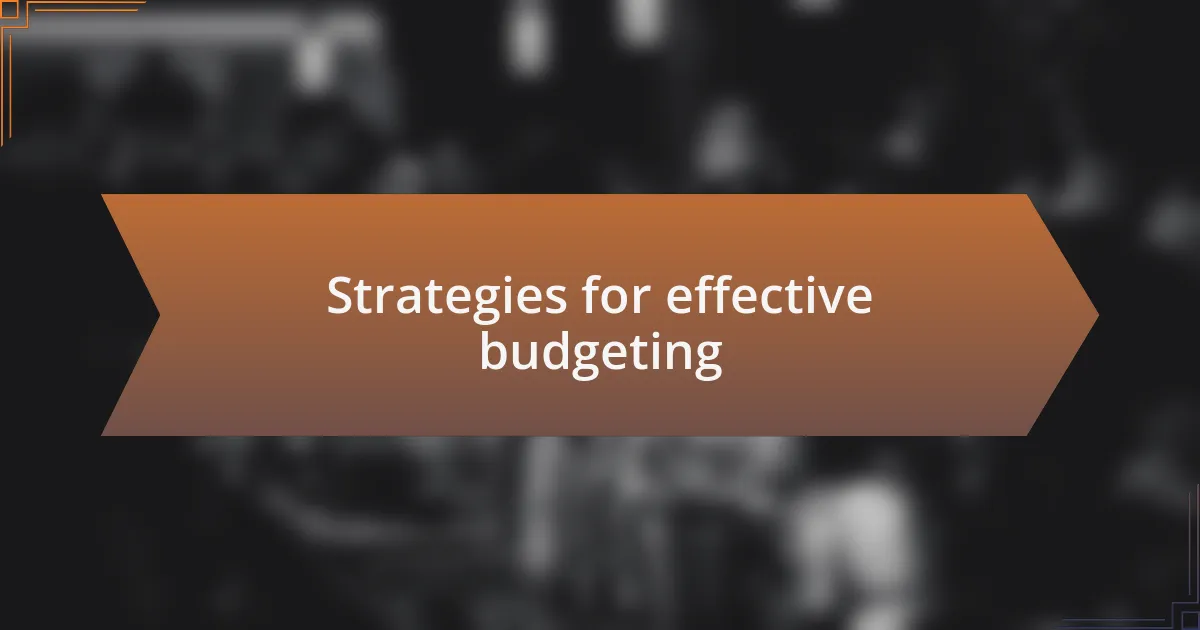
Strategies for effective budgeting
Setting a budget is not just about listing expenses; it’s about creating a financial roadmap that you can follow throughout the event planning process. I’ve found that a zero-based budgeting approach—starting from scratch rather than adjusting previous budgets—enables me to critically assess every expense rather than assume past figures are still relevant. Have you ever considered how refreshing it could be to build your budget from the ground up? It opens up new perspectives on spending and makes you more conscious of where every dollar goes.
One effective strategy I’ve discovered is to implement a contingency fund, typically around 10-15% of the overall budget. This fund acts as a safety net for unexpected costs, ensuring that unforeseen issues don’t derail your financial plan. When I planned a wedding expo, I was grateful for this extra cushion when a last-minute venue change popped up—without it, I might have been left scrambling. Isn’t it a relief to have a plan in place for the unexpected?
Finally, regularly revisiting and adjusting the budget is a key strategy that I cannot emphasize enough. During my experience managing a corporate retreat, I made it a point to review spending weekly, which allowed me to catch discrepancies and adjust allocations in real-time. Have you ever felt the stress of not knowing your financial standing? Keeping a close eye on your budget not only alleviates that anxiety but also empowers you to make informed decisions as the event approaches.
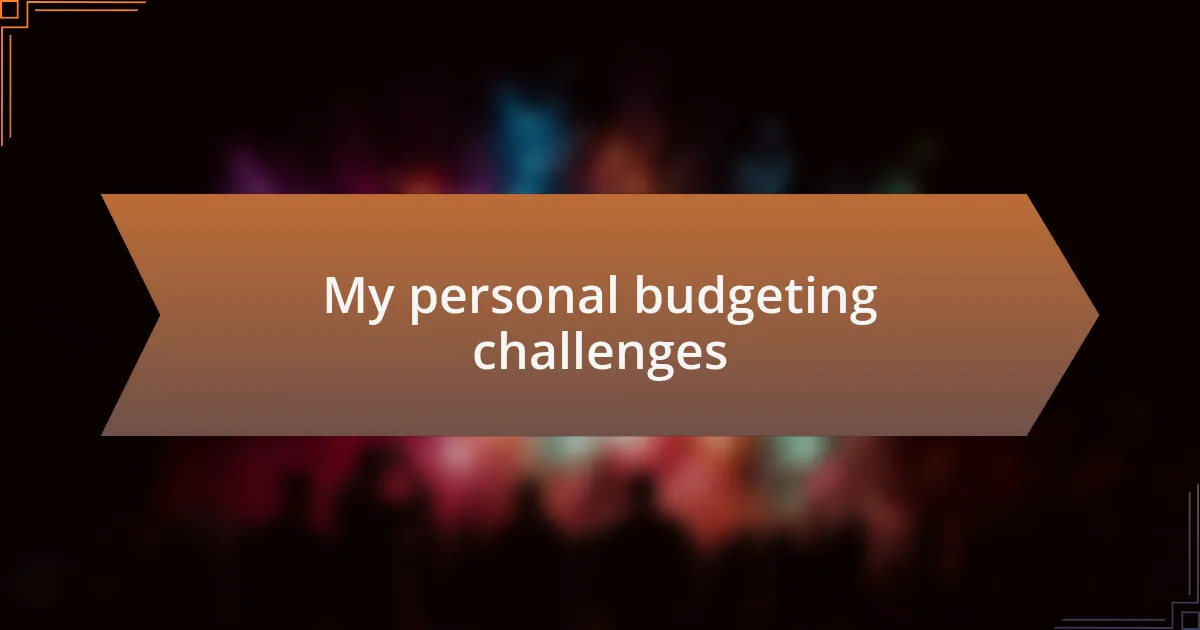
My personal budgeting challenges
I’ve had my fair share of budgeting challenges throughout my event management journey. One time, I confidently allocated my funds based on estimates, thinking that everything would go smoothly. However, when vendor costs came in significantly higher than I anticipated, I was left scrambling to cover the difference. This experience emphasized just how critical it is to be realistic about potential expenses—something I continuously remind myself to do.
Another challenge I faced arose from my tendency to overlook small details. During a recent conference, I forgot to budget for promotional materials, which added an unexpected strain on my finances. I’ve learned that even seemingly minor expenses can add up quickly, becoming significant barriers if not accounted for. Isn’t it fascinating how the small things can sometimes derail a well-laid plan?
Finally, I’ve grappled with the habit of DIY-ing too many aspects of my events to save money. While it felt like a great way to stay within budget initially, I found myself stretched too thin, ultimately sacrificing quality and my peace of mind. Have you ever tried to do it all yourself just to save a few bucks? From that experience, I realized that sometimes investing in professional help can save not just money, but also the sanity that comes with organizing a successful event.

Lessons learned from my mistakes
Managing budgets can be a tough learning experience. I once planned a lavish gala, pouring my heart into every tiny detail, only to realize I had spent far beyond my means. That moment of panic when I saw the final numbers was a rude awakening about the importance of establishing a contingency fund; now, I always set aside a portion of my budget for unexpected expenses.
Another valuable lesson came from my decision to implement tech solutions for tracking expenses, which I naively believed would simplify my process. The reality was anything but. I found myself tangled in complex software, feeling overwhelmed and frustrated. This taught me the importance of choosing the right tools that genuinely match my needs, rather than getting swept up in trends.
There was also a time I relied heavily on forecasts to guide my budgeting decisions, blissfully unaware of how quickly things could change. When ticket sales plummeted unexpectedly, I was devastated by the realization that I should have been prepared for variability. It was a hard pill to swallow, illustrating the necessity of flexible budgeting—one that adapts to changing circumstances rather than clinging to idealized expectations.